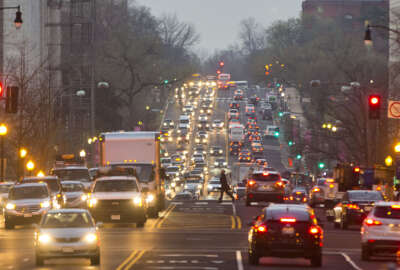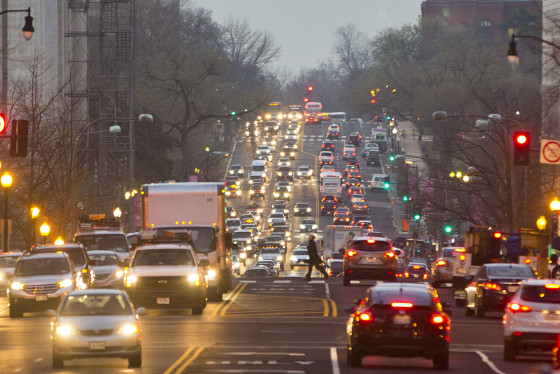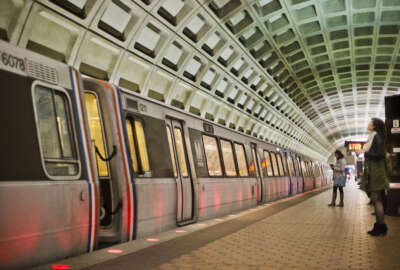
Ridesharing gets a Lyft from House lawmakers
House Lawmakers introduced two bills this week to make rideshare services such as Uber and Lyft reimbursable for federal employees.
Lawmakers want ride-sharing services to pick up the slack, and feds, during a time of disrupted transportation in the Washington D.C. area. Two bills introduced into the House this week seek to address federal employees’ use of Uber, Lyft, other rideshare companies and alternative travel options.
Reps. Mark Meadows (R-N.C.) and Gerry Connolly (D-Va.) introduced a bill on July 6 that would authorize the use of federal employees’ transit benefits on ride-sharing services. In a press release, Meadows and Connolly said that this move was specifically in response to the Metro’s Safetrack program.
“During a time when [Washington Metropolitan Area Transit Authority] is getting its house in order, federal commuters have been frustrated at their lack of options for getting in to work,” Meadows said. “This bill will allow federal workers to expand their commuting options and not require them to depend on a sole, unreliable from of transportation—especially during WMATA’s time period of construction.”
Connolly pointed out that the Safetrack program will last for almost a year, during which time many federal employees will be intermittently without reliable transportation.
“The federal government must offer commuters as many options as possible to mitigate these challenges,” Connolly said. “That includes expanding telework and allowing flexible work schedules, including during off-peak work hours. The ridesharing economy offers a unique and flexible alternative until full Metro service is restored and should be an option for our federal workforce as they maintain a continuity of operations for the federal government.”
Meanwhile, on July 5, a group of lawmakers including Reps. Seth Moulton (D-Mass.), Will Hurd (R-Texas) and Darrell Issa (R-Calif.), introduced a similar bill. Instead of authorizing transportation benefits, it would provide for reimbursement of federal employees for their “use of modern travel services.”
The bill refers to both Uber and Lyft as “transportation network compan[ies],” as well as any other business “that uses a digital network to connect riders to drivers affiliated with such company in order for the driver to transport the rider using the driver’s personal vehicle.”
It also would provide for reimbursement for the use of other “innovative mobility technology compan[ies],” such as car-shares, bike-shares and “app-based mobility providers.”
In addition, it would direct the General Services Administration to recommend regulations to implement these reimbursements less than 90 days after the bill is passed. GSA would also be on the hook for an annual report on these regulations, their efficacy and the cost impact on the federal government for implementing these changes.
All of this comes one month into the Metro Safetrack program, a 10-month plan to improve safety that involves shutdowns and reduced services to various sections of track at different times. Federal employees have already expressed difficulty with increased commutes and cost of travel.
Federal News Radio conducted a survey over three days during the first week of the SafeTrack plan and found that 85 percent of respondents were seeing an increase in commute times. Almost half the respondents said that their commutes had increased by more than half an hour, and about 13 percent said they were more than an hour longer than usual.
The Office of Personnel Management created an inter-agency council to deal with the plan, and encouraged agencies to implement or expand telework, schedule flexibilities and alternate travel options where appropriate, though it fell short of making an actual directive.
OPM later sent out guidance on implementing telework and other flexibilities in a memo that again emphasized that the onus was entirely on agencies, did not issue any blanket decisions.
As the plan progresses, in addition to soliciting the opinions of federal employees, Federal News Radio is contacting agencies with offices located near affected Metro stations to find out what exactly their plans include. Some have gone to great lengths to assist employees, creating SafeTrack specific web portals outlining various resources available to ease the strain of or entirely avoid extended commutes. Others have expressed a “business as usual” mindset.
Lawmakers local to the D.C. area have expressed a variety of opinions, including Rep. Don Beyer (D-Va.), who, like most of his staff, relies on public transit to get to work.
“Look, Metro is America’s transit system, and more than half of federal employees get to work on the Metro,” he told the Federal Drive with Tom Temin in May. “We’re the most important city in the world, and probably with the most important transportation needs. This is a federal system, not just a local system.”
Copyright © 2025 Federal News Network. All rights reserved. This website is not intended for users located within the European Economic Area.
Daisy Thornton is Federal News Network’s digital managing editor. In addition to her editing responsibilities, she covers federal management, workforce and technology issues. She is also the commentary editor; email her your letters to the editor and pitches for contributed bylines.
Follow @dthorntonWFED





